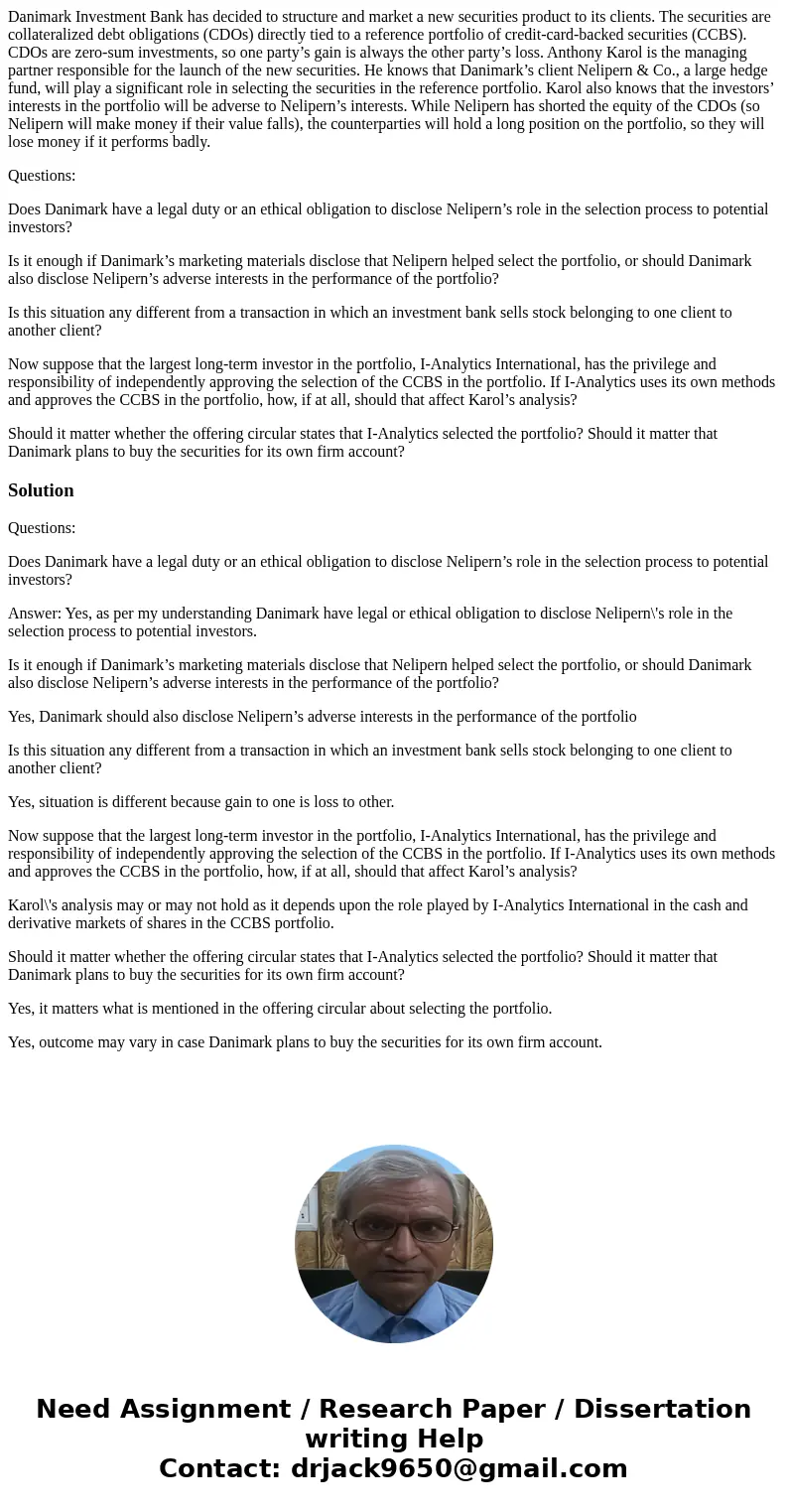Danimark Investment Bank has decided to structure and market
Danimark Investment Bank has decided to structure and market a new securities product to its clients. The securities are collateralized debt obligations (CDOs) directly tied to a reference portfolio of credit-card-backed securities (CCBS). CDOs are zero-sum investments, so one party’s gain is always the other party’s loss. Anthony Karol is the managing partner responsible for the launch of the new securities. He knows that Danimark’s client Nelipern & Co., a large hedge fund, will play a significant role in selecting the securities in the reference portfolio. Karol also knows that the investors’ interests in the portfolio will be adverse to Nelipern’s interests. While Nelipern has shorted the equity of the CDOs (so Nelipern will make money if their value falls), the counterparties will hold a long position on the portfolio, so they will lose money if it performs badly.
Questions:
Does Danimark have a legal duty or an ethical obligation to disclose Nelipern’s role in the selection process to potential investors?
Is it enough if Danimark’s marketing materials disclose that Nelipern helped select the portfolio, or should Danimark also disclose Nelipern’s adverse interests in the performance of the portfolio?
Is this situation any different from a transaction in which an investment bank sells stock belonging to one client to another client?
Now suppose that the largest long-term investor in the portfolio, I-Analytics International, has the privilege and responsibility of independently approving the selection of the CCBS in the portfolio. If I-Analytics uses its own methods and approves the CCBS in the portfolio, how, if at all, should that affect Karol’s analysis?
Should it matter whether the offering circular states that I-Analytics selected the portfolio? Should it matter that Danimark plans to buy the securities for its own firm account?
Solution
Questions:
Does Danimark have a legal duty or an ethical obligation to disclose Nelipern’s role in the selection process to potential investors?
Answer: Yes, as per my understanding Danimark have legal or ethical obligation to disclose Nelipern\'s role in the selection process to potential investors.
Is it enough if Danimark’s marketing materials disclose that Nelipern helped select the portfolio, or should Danimark also disclose Nelipern’s adverse interests in the performance of the portfolio?
Yes, Danimark should also disclose Nelipern’s adverse interests in the performance of the portfolio
Is this situation any different from a transaction in which an investment bank sells stock belonging to one client to another client?
Yes, situation is different because gain to one is loss to other.
Now suppose that the largest long-term investor in the portfolio, I-Analytics International, has the privilege and responsibility of independently approving the selection of the CCBS in the portfolio. If I-Analytics uses its own methods and approves the CCBS in the portfolio, how, if at all, should that affect Karol’s analysis?
Karol\'s analysis may or may not hold as it depends upon the role played by I-Analytics International in the cash and derivative markets of shares in the CCBS portfolio.
Should it matter whether the offering circular states that I-Analytics selected the portfolio? Should it matter that Danimark plans to buy the securities for its own firm account?
Yes, it matters what is mentioned in the offering circular about selecting the portfolio.
Yes, outcome may vary in case Danimark plans to buy the securities for its own firm account.

 Homework Sourse
Homework Sourse